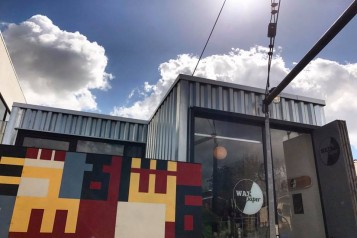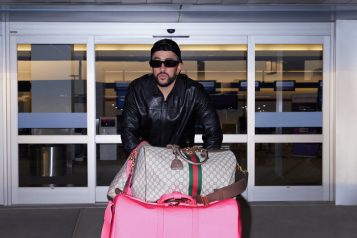By: Laura Schreffler
Photography: Andreas Branch
Grooming: Juanita Lopez
Anyone who’s lived in Los Angeles knows that, even though dreams can come true here, not everyone gets their picture-perfect ending. John Singleton is not only familiar with this sentiment, but has built his career around exposing the gritty underbelly of that quintessential sunset-colored Endless Summer movie poster ideal.
“Los Angeles is a very beautiful place; there are so many different sides to its character. It has an alternating beauty and potential darkness. People come from all around the world to realize their dreams here, but sometimes those lives don’t change for the better. Sometimes, those dreams turn into nightmares—and those are very valid stories to be told, as well,” the 49-year-old director and producer notes.
The other side of perfection is something Singleton has been seeking to showcase on celluloid since starting his career. His first film, the 1991 cult classic Boyz N the Hood, was a narrative of teenage life in then-called South Central L.A. that mirrored his own. It also firmly established his place in Hollywood history, making him the youngest (at age 24) and first African- American director to be nominated for an Academy Award. He followed it up with Poetic Justice in 1993, co-starring Janet Jackson and the late Tupac Shakur, 1995’s Higher Learning, the 2000
The stories he tells are the stories he knows—be it Boyz, or the one-off episode of The People vs. O.J. Simpson: American Crime Story he directed last year that earned him an Emmy. And although he is traditionally a filmmaker, with the sweet taste of success still lingering in his mouth, Singleton is now turning to television with not one but three new projects that pay homage, in some respect, to his California upbringing.
“I’m a native guy from Los Angeles and, throughout history, there have been filmmakers from certain regions who focus on projects that are indelible to those environments. I just thought that, starting out the way I did—with Boyz N the Hood—that it would be interesting to reproduce that in a television sense. I know the environment better than anyone else, and it’s unique to who I am as an artist.”
He recently produced L.A. Burning: The Riots 25 Years Later for A&E about the untold stories of the individuals impacted by the beating of Rodney King by four LAPD officers. (When they were eventually acquitted by a nearly all-white jury, it resulted in a level of social unrest that left 55 dead and over 2,000 injured over a five-day period.) Singleton then headed north to Oakland for BET’s Rebel, a police drama that examines the conflicted relationships that officers of color have with their jobs at a time when police forces are rife with brutality and misconduct.
His third recent project, Snowfall, revolves around the onset of the crack cocaine epidemic in L.A. and its impact on the culture in the early 1980s. “It’s really the story about how cocaine changed Los Angeles, and it deals with the whole of L.A.—it’s South Central, it’s The Valley, it’s East L.A. You’ll see different parts of the city and the different characters that thrive in those different parts.”
He tells interconnecting stories: the CIA operative who goes too deep into a mission, a Mexican wrestler who segues from smoking to dealing marijuana, and a kid who becomes a crack dealer. Each tale has Singleton’s signature edge. “It was a volatile time,” he notes. “It was like the Wild Wild West—a very interesting, vibrant time, and that’s what we’re trying to show.”
But that isn’t all he has on the table, not by a long shot. There’s the secretive movie deal he won’t discuss, as well as the upcoming series for Amazon that he’s more forthcoming about. The show— which is in such early development stages it has yet to be written—is tentatively titled Black Power. It will tell hour-long incremental stories of important African American figures throughout history in a style that sounds part Ryan Murphy, part Alan Ball. “It’s Game of Thrones in the civil rights and black power movements. It’s the stories of all those characters— Malcolm X, Angela Davis, Addie Hoffman and more—but not in the way they’ve been told before. There’s a lot of sex and violence. It’s not a historical era thing; it’s really, really different.”
And Murphy’s influence is no accident. After working together on American Crime Story, the two bonded. “I call him my television mentor,” Singleton says. “I learned a lot from him.” Murphy helped him take a leap of faith and discover the bonuses in creating for the small screen. “What’s great about television, as a director and producer, is that you can create a canvas and explore that whole canvas, that whole world.”
His current predilection for branching out is indicative of how much he’s grown. At 49, Singleton is no longer the young and ambitious kid he once was, navigating the wilds of Hollywood. “I’ve changed as a person,” he maintains. “I’ve matured as a human being. I’ve traveled, I’ve experienced different things. I was a kid when I first came in this business right out of college [at USC]. I’m a much more well-rounded person than I was at the age of 22, and my work reflects that now.”
So does his life, it seems. “I’m adventurous,” he admits. “I like to travel now, and be exposed to different things. I’m like Hemingway—I like to go where the action is.”
Most often, that would be chilling out on his beautiful Beneteau Oceanis 50 in Marina del Rey, soaking up the SoCal sun with his fellow yacht- owning friends (unless he’s shooting a production, of course). It’s an atypical existence, to be sure, for a man whose trademark has become material that focuses on inner-city violence. “I’m a water baby, you know?” Singleton says with a chuckle. “I’m always out on the ocean when I’m not working.” When he’s not jetting to Catalina or San Diego, he’s making five-mile daily treks through the mountains or by the beach, or watching Anthony Bourdain and dreaming of ‘parts unknown’ (or known, as it were—as he mentions traveling to San Sebastian to “just bask in the Basque”).
Life sounds pretty damn near perfect, and he knows it. “[It’s a luxury] to wake up and feel relaxed and not in danger. I went through the first 18, 19, years of my life [not feeling] that way. I was always like, ‘Well, OK, you grow up and you don’t know how long you’re going to live because things are so volatile out there in the environment. I don’t have to deal with that anymore. I’m over my PTSD of growing up in the ’hood,” he says with a laugh. “I wake up, take a deep breath and say, ‘I’m grateful to be alive.’ I really do—that’s no joke.”
He’s also grateful to be working the way that he wants. Though he took a four-year hiatus between directing the 2011 thriller Abduction and a 2015 episode of Empire, it was on his terms, for his reasons.
“My greatest achievement is that I’ve been in the business for 25 years and I haven’t lost my heart,” he says. “I’ve seen people come and go, achieving varying levels of success, and I’ve seen them lose their minds. I’m real level-headed and Zen-like and I’m still having fun with it and I’ve gotten to do what I want to do. I’ve evolved as a person in a positive way within this business.”
He adds, “My goal is to keep myself interested as a filmmaker and to tell stories I’m interested in, to tell stories because I want to do it, because I have something on my mind that I want to get out there. The thing that defines me is that I’m about preservation of the soul, of doing things I really believe in, living my life the way I believe, not compromising any of that and being able to stand by my decisions.”
In fact—dare we say it—John Singleton seems like he’s actually living in The Endless Summer film. And he agrees. “My life started out as a nightmare and became a dream. I grew up in a crazy neighborhood and was able to use that as fodder for me as a storyteller.”
He pauses a beat before adding, “My life just keeps getting better and better.”
























